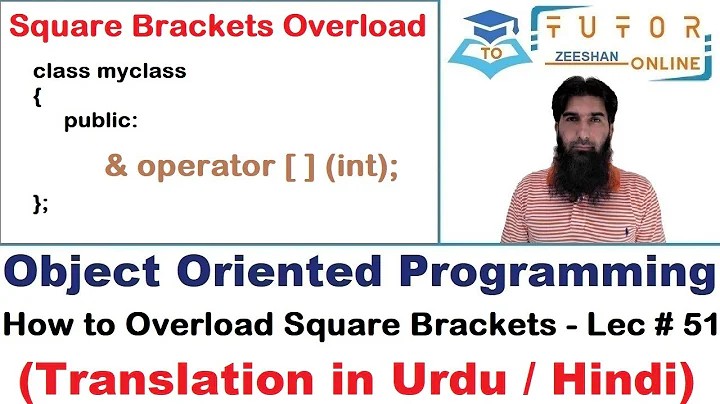Two square bracket overloading
Solution 1
Just overload operator[] and make it return a pointer to the respective row or column of the matrix. Since pointers support subscripting by [], access by the 'double-square' notation [][] is possible then.
You can also overload operator() with two arguments.
Solution 2
There is no operator[][] in C++. You have to return a helper object and then overload operator[] for that too, to have this kind of access.
Solution 3
You could overload operator[]. So if you would like to use matrix that way, you should make matrix as array of vectors.
class Matrix
{
...
Vector & operator[]( int index );
...
};
and
class Vector
{
...
double & operator[]( int index );
...
};
Finally:
Matrix m;
...
double value = m[i][j];
...
Solution 4
there is no operator[][], you can implement operator[] to return a reference to the row/column object, in which you can implement the operator[] to return you the cell reference.
You can do something like the following to avoid all that hassle..
struct loc
{
int x;
int y;
};
then in your operator[] overload, accept a loc, something like
T& operator[](loc const& cLoc)
{
// now you have x/y you can return the object there.
}
To call, you can simply do something like:
matrix[loc(2,3)] = 5;
Solution 5
Actually, I did just that in my own matrix class a few years ago. In this case, I defined a matrix template class that contained the snippet, below.
I was then able to iterate and assign as follows:
for(size_t k=1; k<n; ++k) {
minor[p][k-1]=major[j][k];
}
I hope this helps.
// //////////////////////////////////////////////////////////////////////////////
// list is internal vector representation of n x m matrix
T* list;
// Proxy object used to provide the column operator
template < typename T >
class OperatorBracketHelper
{
Matrix < T > & parent ;
size_t firstIndex ;
public :
OperatorBracketHelper ( Matrix < T > & Parent , size_t FirstIndex ) :
parent ( Parent ), firstIndex ( FirstIndex ) {}
// method called for column operator
T & operator []( size_t SecondIndex )
{
// Call the parent GetElement method which will actually retrieve the element
return parent.GetElement ( firstIndex , SecondIndex );
}
};
// method called for row operator
OperatorBracketHelper < T > operator []( size_t FirstIndex )
{
// Return a proxy object that "knows" to which container it has to ask the element
// and which is the first index (specified in this call)
return OperatorBracketHelper < T >(* this , FirstIndex );
}
T & GetElement ( size_t FirstIndex , size_t SecondIndex )
{
return list[FirstIndex*cols+SecondIndex];
}
Related videos on Youtube
fafa
Updated on October 05, 2020Comments
-
fafa over 3 years
I am writing a matrix class in c++ and trying to overload some operator like = and >> and << etc.
I was unable to overload operator [][] for matrix class. if i have an object of class matrix like M1 then i can use this way for giving value to each element:
M1[1][2]=5;OR
int X; X=M1[4][5]; -
Björn Pollex about 13 yearsI prefer RedX's solution over this one because in my opinion you should not use pointers in C++ unless you absolutely have to.
-
edA-qa mort-ora-y about 13 yearsI find that
operator(x,y)is a good solution in such circumstances. -
 David Stone about 10 yearsThis is an interesting idea I haven't seen before, but is still immediately obvious what it does.
David Stone about 10 yearsThis is an interesting idea I haven't seen before, but is still immediately obvious what it does. -
 Charlie Su about 6 yearsHow do you overload operator() with two arguments? I get a compiler error saying that it "must take exactly one argument" when I try that.
Charlie Su about 6 yearsHow do you overload operator() with two arguments? I get a compiler error saying that it "must take exactly one argument" when I try that.




![Overloading Special [ ] C++ Array Subscript Operator | Cpp Video Tutorial](https://i.ytimg.com/vi/pbxxtg3JQc8/hq720.jpg?sqp=-oaymwEcCNAFEJQDSFXyq4qpAw4IARUAAIhCGAFwAcABBg==&rs=AOn4CLAC38jBBLL-G9clWgwsqk7OWPSRQA)


